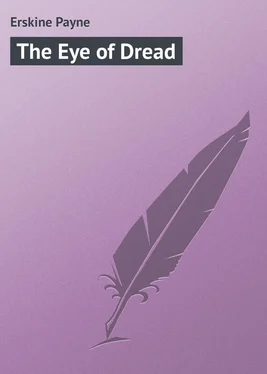Payne Erskine - The Eye of Dread
Здесь есть возможность читать онлайн «Payne Erskine - The Eye of Dread» — ознакомительный отрывок электронной книги совершенно бесплатно, а после прочтения отрывка купить полную версию. В некоторых случаях можно слушать аудио, скачать через торрент в формате fb2 и присутствует краткое содержание. Жанр: foreign_prose, на английском языке. Описание произведения, (предисловие) а так же отзывы посетителей доступны на портале библиотеки ЛибКат.
- Название:The Eye of Dread
- Автор:
- Жанр:
- Год:неизвестен
- ISBN:нет данных
- Рейтинг книги:4 / 5. Голосов: 1
-
Избранное:Добавить в избранное
- Отзывы:
-
Ваша оценка:
- 80
- 1
- 2
- 3
- 4
- 5
The Eye of Dread: краткое содержание, описание и аннотация
Предлагаем к чтению аннотацию, описание, краткое содержание или предисловие (зависит от того, что написал сам автор книги «The Eye of Dread»). Если вы не нашли необходимую информацию о книге — напишите в комментариях, мы постараемся отыскать её.
The Eye of Dread — читать онлайн ознакомительный отрывок
Ниже представлен текст книги, разбитый по страницам. Система сохранения места последней прочитанной страницы, позволяет с удобством читать онлайн бесплатно книгу «The Eye of Dread», без необходимости каждый раз заново искать на чём Вы остановились. Поставьте закладку, и сможете в любой момент перейти на страницу, на которой закончили чтение.
Интервал:
Закладка:
“Ah,” replied her husband, with fond optimism, “you need not say ‘If I were a man,’ for that. It is the women who have the influence; don’t you know that, Mary?”
Mary looked down at her work, an incredulous smile playing about her lips.
“Well, my dear?” Bertrand loved a response.
“Well, Bertrand? Men do like to talk about our ‘sweet influence,’ don’t they?” Then she laughed outright.
“But, Mary–but, Mary, it is true. Women do more with their influence than men can do with their guns,” and Bertrand really meant what he said. Dusky shadows filled the room, but if the light had been stronger, he would have seen that little ironical smile still playing about his wife’s lips.
“Did you see Judge Logan again about those Waupaca lots?”
Bertrand wondered what the lots had to do with the subject, but suffered the digression patiently, for the feminine mind was not supposed to be coherent. “Yes, my love; I saw him yesterday.”
“What did you do about them? I hope you refused.”
“No, my dear. I thought best not. He showed me very conclusively that in time they will be worth more–much more–than the debt.”
“Then why did he offer them to you for the debt? The portrait you painted for him will be worth more, too, in time, than the debt. You remember when you asked me what I thought, I said we needed the money more now.”
“Yes, I remember; but this plan is a looking toward the future. I didn’t think it wise to refuse.”
Mary said nothing, but went out, returning presently with two lighted candles. Bertrand was replenishing the fire. Had he been looking at her face with the light of the candles on it as she carried them, he would have noticed that little smile about her lips.
“I’m very glad we brought the bees in yesterday,” he said. “This storm would have made it impossible to do it to-day, and we should have lost them.”
“How about those lectures, dear? The ‘boys’ are all gone now, and you won’t have them to take up your time evenings, so you can easily prepare them. They will take you into the city now and then, and that will keep you in touch with the world outside this village.” Bertrand had been requested to give a series of lectures on art in one of the colleges in the city. He had been well pleased and had accepted, but later had refused because of certain dictatorship exercised by the Board, which he felt infringed on his province of a suitable selection of subjects. He was silent for a moment. Again Mary had irrelevantly and abruptly changed the subject of conversation. Where was the connection between bees and lectures? “I really wish you would, dear,” urged Mary.
“You still wish it after the affront the Board has given me?”
“I know, but what do they know about art? I would give the lectures if it was only to be able–incidentally–to teach them something. Be a little conciliatory, dear.”
“I will make no concessions. If I give the lectures, I must be allowed to select my courses. It is my province.”
“Did you see Elder Craigmile about it?”
“I did.”
“And what did he say?”
“He seemed to think the Board was right.”
“I knew he would. You remember I asked you not to go to him about it, and that was why.”
“Why did you think so? He assumes to be my friend.”
“Because people who don’t know anything about art always are satisfied with their own opinions. They don’t know anything to upset them. He knows more than some of them, but how much is that? Enough to know that he owns some fine paintings; but you taught him their value, now, didn’t you?” Bertrand smiled, but said nothing, and his wife continued. “Prepare the lectures, dear, for my sake. I love to know that you are doing such work.”
“I can’t. The action of the Board is an insult to my intelligence. What are you smiling about?”
“About you, dear.”
“Mary, why, Mary! I–”
But Mary only smiled the more. “You love my irrelevance and inconsistency, you say,–”
“I love any weakness that is yours, Mary. What are you keeping back from me?”
“The weakness that is mine, dear.” Again Mary laughed outright. “It would be useless to tell you–or to try to explain. I love you, isn’t that enough?”
Bertrand thought it ought to be, but was not sure, and said so. Then Mary laughed again, and he kissed her, shaking his head dubiously, and took up his violin for solace. Thus an hour passed; then Betty set the table for supper, and the long evening followed like many another evening, filled with the companionship only comfortably married people know, while Bertrand read from the poets.
Since, with a man’s helplessness in such matters, he could not do the family mending, or knit for the soldiers, or remodel old garments into new, it behooved him to render such tasks pleasant for the busy hand and brain that must devise and create and make much out of little for economy’s sake; and this Bertrand did to Mary’s complete satisfaction.
Evenings like these were Betty’s school, and they seemed all the schooling she was likely to get, for the family funds were barely sufficient to cover the expenses of one child at a time. But, as Mary said, “It’s not so bad for Betty to be kept at home, for she will read and study, anyway, because she likes it, and it won’t hurt her to learn to be practical as well;” and no doubt Mary was right.
Bertrand was himself a poet in his appreciation and fineness of choice, and he read for Mary with all the effectiveness and warmth of color that he would put into a recitation for a large audience, carried on solely by his one sympathetic listener and his love for what he read; while Betty, in her corner close to the lamp behind her father’s chair, listened unnoticed, with eager soul, rapt and uplifted.
As Bertrand read he commented. “These men who are writing like this are doing for this country what the Lake Poets did for England. They are making true literature for the nation, and saving it from banality. They are going to live. They will be classed some day with Wordsworth and all the rest of the best. Hear this from James Russell Lowell. It’s about a violin, and is called ‘In the Twilight.’ It’s worthy of Shelley.” And Bertrand read the poem through, while Mary let her knitting fall in her lap and listened. He loved to see her listen in that way.
“Read again the verse that begins: ‘O my life.’ I seem to like it best.” And he read it over:–
“O my life, have we not had seasons
That only said, Live and rejoice?
That asked not for causes and reasons,
But made us all feeling and voice?
When we went with the winds in their blowing,
When Nature and we were peers,
And we seemed to share in the flowing
Of the inexhaustible years?
Have we not from the earth drawn juices
Too fine for earth’s sordid uses?
Have I heard, have I seen
All I feel, all I know?
Doth my heart overween?
Or could it have been
Long ago?”
“And the next, Bertrand. I love to hear them over again.” And he read:–
“Sometimes a breath floats by me,
An odor from Dreamland sent,
That makes the ghost seem nigh me
Of a splendor that came and went,
Of a life lived somewhere, I know not
In what diviner sphere,
Of memories that stay not and go not,
Like music heard once by an ear
That cannot forget or reclaim it,
A something so shy, it would shame it
To make it a show,
A something too vague, could I name it,
For others to know,
As if I had lived it or dreamed it,
As if I had acted or schemed it,
Long ago!“
“And the last verse, father. I like the last best,” cried Betty, suddenly.
Читать дальшеИнтервал:
Закладка:
Похожие книги на «The Eye of Dread»
Представляем Вашему вниманию похожие книги на «The Eye of Dread» списком для выбора. Мы отобрали схожую по названию и смыслу литературу в надежде предоставить читателям больше вариантов отыскать новые, интересные, ещё непрочитанные произведения.
Обсуждение, отзывы о книге «The Eye of Dread» и просто собственные мнения читателей. Оставьте ваши комментарии, напишите, что Вы думаете о произведении, его смысле или главных героях. Укажите что конкретно понравилось, а что нет, и почему Вы так считаете.












